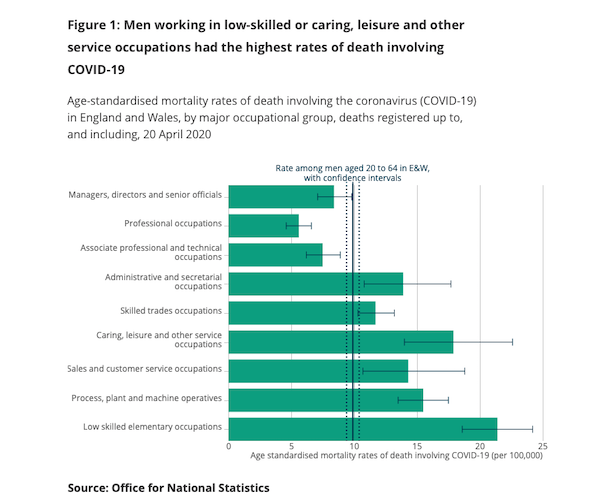HEALTH WARNING
We are no longer updating our Covid-19 hub regularly. That includes this page. Follow the link below for the latest.
We are no longer updating our Covid-19 hub regularly. That includes this page. Click here for the latest.
Men in jobs that cannot be done from home are most likely to be killed by Covid-19.
That conclusion may seem obvious but as more and more people are being encouraged to return to work, it is important that the obvious is not forgotten.
The ONS examined the 2,494 deaths involving Covid-19 up to 20 April. Two-thirds of these were in men. For men overall, this gave a death rate per 100,000 of population of 9.9 (compared to 5.2 for women). But men in certain lines of work died at a far higher rate with men in the ‘lowest skilled occupations’ twice as likely to die.
Some occupations had even higher death rates per 100,000:
One thing these high-risk professions have in common is that the work cannot be done from home. In many cases, they require close contact with other people.
These are worrying statistics and show just how important it is that any return to work is safe. The ONS table below compares death rates across occupations. You can also share our tweet below.

Please share our tweet:
This new report from @ONS is devastating. Death rates for men higher overall & in some jobs e.g. security, driving (cabs and buses), construction hugely higher than those faced by other men & by women. But still no govt action taking sex & gender into a/c. https://t.co/NuRrUa5ICR
— Men's Health Forum (@MensHealthForum) May 11, 2020
|
The Men’s Health Forum need your support It’s tough for men to ask for help but if you don’t ask when you need it, things generally only get worse. So we’re asking. In the UK, one man in five dies before the age of 65. If we had health policies and services that better reflected the needs of the whole population, it might not be like that. But it is. Policies and services and indeed men have been like this for a long time and they don’t change overnight just because we want them to. It’s true that the UK’s men don’t have it bad compared to some other groups. We’re not asking you to ‘feel sorry’ for men or put them first. We’re talking here about something more complicated, something that falls outside the traditional charity fund-raising model of ‘doing something for those less fortunate than ourselves’. That model raises money but it seldom changes much. We’re talking about changing the way we look at the world. There is nothing inevitable about premature male death. Services accessible to all, a population better informed. These would benefit everyone - rich and poor, young and old, male and female - and that’s what we’re campaigning for. We’re not asking you to look at images of pity, we’re just asking you to look around at the society you live in, at the men you know and at the families with sons, fathers and grandads missing. Here’s our fund-raising page - please chip in if you can. |